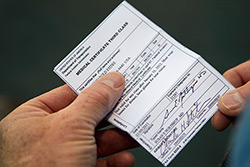Answers for Pilots: Are you special?
Obtaining a special issuance medical certificate
 Healthy pilots, whose visits to their aviation medical examiners are routinely non-events, may never have heard of a special issuance (SI) authorization. But for more than 25,000 pilots, obtaining a special issuance medical certificate is the difference between flying and being grounded.
Healthy pilots, whose visits to their aviation medical examiners are routinely non-events, may never have heard of a special issuance (SI) authorization. But for more than 25,000 pilots, obtaining a special issuance medical certificate is the difference between flying and being grounded.
The FAA created the SI authorization to provide more flexibility in granting medical certificates to pilots with serious medical conditions. There are 15 medical conditions identified in Part 67 of the Federal Aviation Regulations ( the medical standards for airmen) that are disqualifying “by medical history or clinical diagnosis.” If you have any of these conditions, the only way the FAA can grant a medical certificate is with an “authorization.” The fifteen conditions are: diabetes mellitus; angina pectoris; coronary heart disease that has been treated or, if untreated, that has been symptomatic or clinically significant; myocardial infarction (heart attack); cardiac valve replacement; permanent cardiac pacemaker; heart replacement; psychosis; bipolar disorder; personality disorder that is severe enough to have repeatedly manifested itself by overt acts; substance dependence (including alcohol); substance abuse; epilepsy; disturbance of consciousness without a satisfactory explanation of cause.
The FAA doesn’t limit SI authorization to these 15 conditions, however, but can extend it to include any medical condition that could progress adversely (for example, sleep apnea, moderate or severe osteoarthritis, or cancer). Decisions are made on a case-by-case basis.
While it’s good news that pilots with disqualifying conditions can be certified under special issuance, it’s not a cake walk. The Federal Air Surgeon’s authorization of these certificates is discretionary and comes with requirements for periodic medical checks. The duration of the SI authorization is determined by the type of medical condition and the perceived risk of incapacitation that could result. A pilot who is issued a SI authorization will find it is likely limited to—and dependent on—annual medical reevaluations verifying no adverse change in his or her condition. The exam can involve anything from a simple status report from the treating physician to a complete reexamination with comprehensive (and expensive) diagnostic testing. Additional limitations may be placed on the operational privileges of the certificate, such as limiting a second class medical holder to carrying passengers for hire only when part of a qualified two-pilot crew. If there is a change for the worse, the FAA can withdraw the authorization, leaving the pilot grounded until—and if—the condition improves and the pilot is re-evaluated.
Applicants for a special issuance authorization will need to send FAA medical information specific to the type of disqualifying condition. Often, that first round of records will be all the FAA needs to make a decision. Sometimes, though, additional information is needed, especially if the first records sent are incomplete or inconclusive, or if there are abnormal results indicated. You may get several letters over a period of months asking for more information before finally getting a decision. You can know exactly what information FAA will need in order to process your application by using AOPA’s free TurboMedical® pre-medical exam screening program and making sure the package of information you send includes all the reports indicated in TurboMedical®.
Although the doctors in Oklahoma City won’t ask you for any more information than is necessary, they also won't issue a certificate until they have a complete medical profile. The process can be frustrating and time consuming. AOPA has a Medical Services Program (MSP) to help pilots through the special issuance process and minimize hassle. MSP program participants work with AOPA medical certification specialists, who act as an advocate with the FAA, contacting FAA aeromedical reviewers on a regular basis to help track the progress of their medical certificate applications.
If you are a candidate for a special issuance medical certificate, join AOPA for a Webinar on Special Issuance, Wednesday, October 26. There will be two sessions – at 3:00 p.m. and 9:00 p.m. Eastern time. Gary Crump, AOPA Director of Medical Certification will host the Webinar. Sign up online.
To speak with a medical certification specialist, call AOPA, 800-USA-AOPA (872-2672), Monday through Friday, 8:30 a.m. to 6:00 p.m. Eastern Time.



